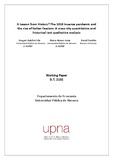Mostrar el registro sencillo del ítem
A lesson from history? The 1918 influenza pandemic and the rise of Italian fascism: a cross-city quantitative and historical text qualitative analysis
| dc.creator | Galofré-Vilà, Gregori | es_ES |
| dc.creator | Gómez León, María | es_ES |
| dc.creator | Stuckler, David | es_ES |
| dc.date.accessioned | 2021-07-23T08:32:23Z | |
| dc.date.available | 2021-07-23T08:32:23Z | |
| dc.date.issued | 2021 | |
| dc.identifier.uri | https://hdl.handle.net/2454/40208 | |
| dc.description.abstract | Objectives: Evidence linking past experiences of worsening health and support for radical political views has generated concerns about the consequences of the COVID-19 pandemic. The influenza pandemic that began in 1918 had a devastating impact on mortality. We test the hypothesis that deaths from the 1918 influenza pandemic contributed to the rise of fascism in Italy. Study design: Cross-sectional study comparing votes for the Fascist party and other mainstream parties in Italian cities in the general election of April 1924, using data that Corbetta and Piretti collected from state archives with yearly cause-specific mortality data, taken from the Italian historical statistical books (Statistica Delle Cause di Morte, edited by the Ministero per L'Industria, Il Commercio e Il Lavoro). Methods: We linked city-level regression models of Fascist vote shares in the 1924 election on changes in deaths from influenza in 1918 in 73 Italian cities, adjusting for socioeconomic factors, city-characteristics and regional dummies. To provide a 'thicker' interpretation of these quantitative patterns, we applied historical text mining to the newspaper Il Popolo d'Italia (Mussolini's newspaper). Results: 4.1 million Italians contracted influenza and about 500,000 died. In cities with influenza death rates the Fascists gained higher vote shares. Each additional 1influenza death/1,000 population was associated with a 3.12-percentage-point increase in vote share for the Fascist party in 1924 (95 % confidence interval [CI]=0.44 to 5.79). These results were consistent even after adjusting for casualties in World War I and indicators of social conflicts and economic hardship. There was no association between higher mortality and vote share for the Socialist or Communist parties. Historical archival analysis also shows how the Fascists exploited the pandemic for political gain. Conclusions: Death rates from influenza in Italian cities were associated with a higher share of votes for the Fascist party. Our observations are consistent with evidence from other contexts that worsening mortality rates can fuel radical politics. Unequal impacts of pandemics may have polarizing political consequences. | en |
| dc.description.sponsorship | David Stuckler is funded by a Wellcome Trust and European Research Council Investigator Award (ERC HRES 313590). | en |
| dc.format.extent | 19 p. | |
| dc.format.mimetype | application/pdf | en |
| dc.language.iso | eng | en |
| dc.relation.ispartofseries | Documentos de Trabajo DE - ES Lan Gaiak | es |
| dc.relation.ispartofseries | 2102 | |
| dc.rights | CC Attribution-NonCommercial-NoDerivatives 4.0 International (CC BY-NC-ND 4.0) | es |
| dc.rights.uri | https://creativecommons.org/licenses/by-nc-nd/4.0/ | |
| dc.subject | 1918 influenza pandemic | en |
| dc.subject | Italian fascism | en |
| dc.subject | Political radicalization | en |
| dc.title | A lesson from history? The 1918 influenza pandemic and the rise of Italian fascism: a cross-city quantitative and historical text qualitative analysis | en |
| dc.type | info:eu-repo/semantics/workingPaper | en |
| dc.type | Documento de trabajo / Lan gaiak | es |
| dc.contributor.department | Economía | es_ES |
| dc.contributor.department | Ekonomia | eu |
| dc.contributor.department | Institute for Advanced Research in Business and Economics - INARBE | es_ES |
| dc.rights.accessRights | info:eu-repo/semantics/openAccess | en |
| dc.rights.accessRights | Acceso abierto / Sarbide irekia | es |



